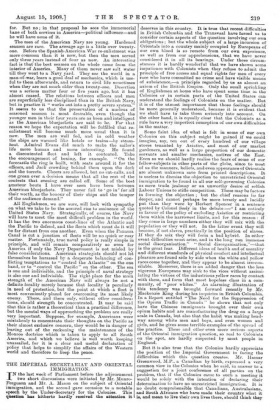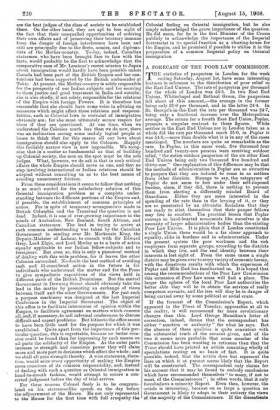THE IMPERIAL SECRETARIAT AND ORIENTAL IMMIGRATION.
IN the last week of Parliament before the adjournment two short discussions were initiated by Mr. Munro- Ferguson and Mr. A. Mason on the subject of Oriental immigration, and the second gave occasion to a notable speech by the Under-Secretary for the Colonies. This question has hitherto hardly reoeived the attention it deserves in this country. It is true that recent difficulties in British Columbia and the Transvaal have toroed us to consider certain aspects of the question involving our own obligations ; but the whole subject of a large incursion of Orientals into a country mainly occupied by Europeans of our own blood is so remote from our own experience, as well as from our apprehensions, that we have never considered it in all its bearings. Under these circum- stances it is hardly wonderful that we have shown some impatience with Colonists when they refuse to admit the principle of free access and equal rights for men of every race who have committed no crime and have visible means of subsistence,—a principle regarded by us as almost an axiom of the British Empire. Only the small sprinkling of Englishmen at home who have spent some time in the Colonies or in certain parts of the United States can understand the feelings of Colonists on the matter. But it is of the utmost importance that those feelings should be more generally understood, because it is evident that we shall have to take them seriously into account. On the other hand, it is equally clear that the Colonists as a rule have a very imperfect conception of our own difficulties in the matter.
Some faint idea of what is felt in some of our own Colonies on this subject might be gained if we could imagine, say, ten out of every hundred of our village stores tenanted by Asiatics, and most of our market gardeners, as well as a large proportion of our domestic servants and smaller mechanics, natives of the East. Even so we should hardly realise the fears of some of our fellow-subjects in other parts of the globe, since to most of us the manners, beliefs, and even appearance of Orientals are almost unknown save from printed descriptions. It is useless to dismiss the objection to unrestricted Oriental immigration to be found in all our self-governing Colonies as mere trade jealousy or an unworthy desire of selfish Labour Unions to stifle competition. These may be factors in forming the objection ; but the chief reasons lie far deeper, and cannot perhaps be more tersely and lucidly put than they were by Herbert Spencer in a sentence quoted by Colonel Seely in the debate :—" I am entirely in favour of the policy of excluding Asiatics or restricting them within the narrowest limits, and for this reason : if they come in large numbers either they will mix with the population or they will not. In the latter event they will become, if not slaves, practically in the position of slaves. If they do mix they will form a bad hybrid. In either event difficulties must arise, and in the long run immense social disorganisation." " Social disorganisation,"—that is the great fear. Different ideas of health and of morality and different standards of physical comfort and intellectual pleasure are found side by side when the white and yellow races come together, and they appear to be almost irrecon- cilable. Moreover, there is an added danger that the less vigorous Europeans may sink to the vices without assimi- lating the virtues of the industrious yellow races by contact with them, and form that most hopeless class in a com- munity, of "poor whites." An alarming illustration of this tendency was brought forward recently by Mr. Mackenzie King during his inquiries in British Columbia. In a Report entitled "The Need for the Suppression of the Opium Traffic in Canada" he shows that not only have the Chinese immigrants brought over their own opium habits and are manufacturing the drug on a large scale in Canada, but also that the habit was making head- way among white men and boys, and even women and girls, and he gives some terrible examples of the spread of the practice. These and other even more serious aspects of the Oriental immigration question, so real to Colonists on the spot, are hardly suspected by most people in England.
But it is also true that the Colonies hardly appreciate the position of the Imperial Government in facing the difficulties which this question creates. Mr. Hamar Greenwood, M.P., a Canadian by birth, expressed a very common view in the Colonies when he said, in answer to a suggestion for a joint conference of all parties on the problem, that if the Colonies came to such a meeting it would be solely with the intention of declaring their determination to have no unrestricted immigration. It is no doubt comprehensible that Canadians, Australasians, and South Africans who have made their country what it is, and mean to live their own lives there, should think they are the best judges of the class of society to be established there. On the other hand, they are apt to lose sight of the fact that their unequalled opportunities of ordering their own affairs and of preserving their territory immune from the danger of foreign interference have been and still are principally due to the fleets, armies, and diploma- tists of the Mother-country. To-day, indeed, Canadian statesmen, who have been brought face to face with the facts, would probably be the first to acknowledge that the comparative ease of Mr. Lemieux's recent mission to Japan about immigration would hardly have been possible unless Canada had been part of the British Empire and her con- tentions had been supported by the British ambassador at Tokio. At present, the Mother-country is solely responsible for the prosperity of our Indian subjects and for securing to them justice and good treatment in India and outside; she is also chiefly, if not solely, responsible for the relations of the Empire with foreign Powers. It is therefore but reasonable that she should have some voice in advising on measures which might affect these relations and responsi- bilities, such as Colonial laws in restraint of immigration obviously are ; for she must ultimately secure respect for them if they are questioned. At one time, when we understood the Colonies much less than we do now, there was an inclination among some unduly logical people at home to think that for this reason all our laws about immigration should also apply to the Colonies. Happily this foolishly narrow view is now impossible. We recog- nise that in a matter so fundamental as that of building up Colonial society, the men on the spot must be the sole judges. What, however, we do ask is that in such critical affairs the whole Empire should move as one, and that no step involving international or Indian relations should be adopted without consulting us as to the best means of avoiding unnecessary friction.
From these considerations it seems to follow that nothing is so much needed for the satisfactory solution of this Oriental immigration problem as a complete under- standing between the different portions of the Empire and, if possible, the establishment of common principles of action. For in spite of temporary arrangements made in British Columbia and the Transvaal the question is not dead. Indeed, it is one of ever-growing importance in the minds of Australian, New Zealand, South African, and Canadian statesmen. The lead in trying to arrive at such common understanding was taken by the Canadian Government in sending over Mr. Mackenzie King, the Deputy-Minister of Labour, to consult with Sir Edward Grey, Lord Elgin, and Lord Morley as to a basis of action equally applicable to our Indian fellow-subjects and to foreigners. But even so, this is only a piecemeal method of dealing with this wide problem, for it leaves the other Colonies untouched. No doubt the best method of avoiding rash and ill-considered action in the future is for individuals who understand the matter and for the Press to give sympathetic expositions of the views held in different parts of the British Dominions. But the central Government in Downing Street should obviously take the lead in the matter by promoting an exchange of views between itself and the other Governments. For just such a purpose machinery was designed at the last Imperial Conference in the Imperial Secretariat. The object of this office is to facilitate intercourse of opinion within the Empire, to facilitate agreement on matters which concern all, and, if necessary, to call informal conferences to discuss difficult and urgent problems. But hitherto the office seems to have been little used for the purpose for which it was established. Quite apart from the importance of this par- ticular question, this is regrettable, because no better occa- sion could be found than for impressing by such means on all parts the solidarity of the Empire. As the outer parts increase in strength and conscious power they will claim more and more part in decisions which affect the whole ; and we shall all gain strength thereby. A wise statesman, there- fore, would seize every opportunity of making the Empire more conscious of its common responsibility, and, instead of dealing with such a question as Oriental immigration in hand-to-mouth fashion, would attempt to secure a con- certed judgment before the day of trial arrives.
For these reasons Colonel Seely is to be congratu- lated on his statesmanlike speech on the day before the adjournment of the House. He not only represented to the House for the first time with full sympathy the Colonial feeling on Oriental immigration, but he also amply acknowledged the grave importance of the question. He did more, for he is the first Minister of the Crown publicly to acknowledge the importance of the Imperial Secretariat in its special function as a clearing-house for the Empire, and he promised if possible to utilise it in the preparation of a common Imperial policy on Oriental immigration.







































 Previous page
Previous page